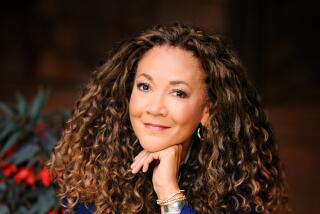Race Relations Panel Stresses Education
- Share via
President Clinton’s much-discussed, oft-maligned and vigorously defended national conversation on race touched down Tuesday in Los Angeles, bringing together a provocative group of Southland leaders and turning immediately to Topic 1A in the city’s recent race relations history.
Not affirmative action. Not immigration reform. Not the beating of Rodney G. King or even the 1992 riots. The jumping-off point for Tuesday’s discussion at the Simon Wiesenthal Center’s Museum of Tolerance was, instead, the murder trial of O.J. Simpson.
“Race was an issue [in that case], and it shouldn’t have been an issue,” said Marc Saunders, a Los Angeles County sheriff’s deputy. “People in the community didn’t understand.”
Around the horseshoe-shaped ring of desks, some participants nodded and others listened impassively. An ethnically and professionally diverse panel that included Mayor Richard Riordan’s chief of staff, the head of the city’s human relations agency, hate crime experts, police, several Southern California city managers and a filmmaker included one person who suggested that the murder trial and subsequent civil case illustrated the need for mandatory citizenship classes in schools.
*
Among other things, she said, such classes would have helped teach more people why Simpson’s civil trial did not violate the prohibition against trying a person twice for the same offense.
“Ignorance breeds fear,” she said. “Fear breeds violence.”
While L.A.’s preoccupation with the Simpson case makes it unusual in the national discussion about the state of race relations, the solutions floated by Tuesday’s panelists were for the most part familiar. Education and expansion of economic opportunity topped the lists of most participants. Afterward, Deputy Assistant Secretary of Defense William E. Leftwich III said those areas are the most frequently mentioned in discussions across the country.
“People see education as doing a couple of things,” said Leftwich, who oversees equal opportunity issues for the Defense Department and who moderated Tuesday’s panel. “It informs people about their differences, and it positions the child or student to do better in life.”
Although many echoed those themes Tuesday, the issue also sparked some sharp differences. Eugene Volokh, an acting professor of law at UCLA, criticized public schools and suggested government should expand school choice and refocus on basic education.
“The public school system does not do a good job at teaching kids reading, writing and arithmetic,” he said. “It’s failing a lot of kids.”
Across the room, however, Lana Ayeroff-Brody shook her head and retorted that “elitist kind of thought” and criticism of public schools were not going to improve race relations. Instead, she highlighted a program at Palms Middle School, where she is assistant principal, in which sixth- and eighth-graders regularly gather in small groups to talk about issues of race and culture. This helps children understand one another without homogenizing them, she said.
*
In general, the idea that talk helps bridge racial gaps carried the day. Several panel members effusively praised Clinton for launching the discussion on race. Joe Hicks, a longtime civil rights leader in Los Angeles, called the dialogue “one of the most important things that has happened in this country in a long time.” He acknowledged that there was some cynicism about the president’s initiative, and other members of the group expressed concern that too few views were being heard.
Hicks suggested that mayors host similar conversations too.
Robin Kramer, Riordan’s chief of staff, said she believed that more progress would be made by finding projects that bring communities together. After the discussion, she cited the mayor’s Targeted Neighborhood Initiative, which singles out marginal communities and offers small seed grants to organizations that present improvement plans. “You have people working together on their own neighborhood; it creates understanding,” she said.
Recommendations from the L.A. panel will be sent to the White House along with those from other sessions across the country, Leftwich said, and used to form policy.
More to Read
Sign up for Essential California
The most important California stories and recommendations in your inbox every morning.
You may occasionally receive promotional content from the Los Angeles Times.














